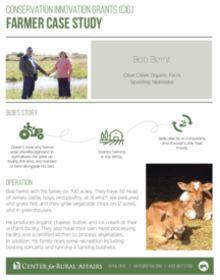- Doesn’t have any formal education/background in agriculture—he grew up loving the land, and wanted to farm alongside his dad.
- Started farming in the 1970s.
- Sells directly to consumers, and through Lone Tree Foods.
Operation
Bob farms with his family on 700 acres. They have 50 head of Jersey cattle, hogs, and poultry, all of which are pastured and grass fed, and they grow vegetable crops on 12 acres, and in greenhouses.
He produces organic cheese, butter, and ice cream at their on-farm facility. They also have their own meat processing facility, and a certified kitchen to process vegetables. In addition, his family does some recreation including hosting concerts and running a tanking business.
Conservation practices used
- Has implemented cover crops and crop rotations since the 1970s.
- Tries to farm as close to a closed-loop system as possible. Repurposes the whey from their dairy production to feed hogs.
- Livestock mob graze annuals and perennials in small paddocks.
- Buffer strips are along all water sources on the farm.
- Tills, but uses a no-till planter.
- Uses milk to amend soil as a fertilizer source.
On conservation
"Conservation is very important to me and my family—it’s our way of life. Successful crops start with healthy soil and water. My customers care about the quality of their food. They like to know how the land is treated, and how the livestock are taken care of."
"More farmers should focus on rebuilding the soil, but to do so, they are going to have to change their perspective on agriculture. Sequestering carbon is important, and we need to take action now to prevent further issues down the road."
Advice to beginning farmers
“Surround yourself with successful, uplifting people. Farming is a challenge— it’s hard to do on your own. It can be discouraging—you might lose a crop, or some livestock—but it’s important to be resilient and stay positive. Have an open mind, and surround yourself with folks who do what you want to accomplish.”
Read more about Bob Bernt on our blog by clicking here.
This material is based upon work supported by the Natural Resources Conservation Service, U.S. Department of Agriculture, under number 69-3A75-17-46. Any opinions, findings, conclusions, or recommendations expressed in this publication are those of the author(s) and do not necessarily reflect the views of the USDA. USDA is an equal opportunity provider and employer.


